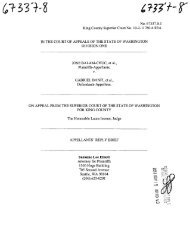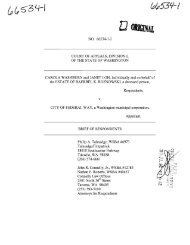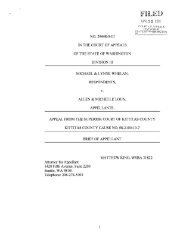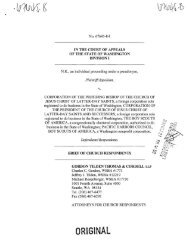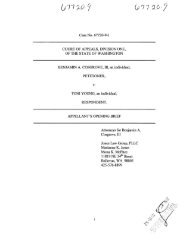Washington State Courts
Washington State Courts
Washington State Courts
Create successful ePaper yourself
Turn your PDF publications into a flip-book with our unique Google optimized e-Paper software.
As far as other purported suspicious conduct, Walker believed B.<br />
H. did not jaywalk because he did not want police to contact him. Walker<br />
said that in his experience, B.-H.'s behavior was consistent with<br />
individuals carrying contraband. The trial court concluded B.-H.'s<br />
"suspicious behavior" provided Walker with further reason to suspect B.<br />
H. had a gun. CP 48 (Conclusion of Law 3).<br />
As a federal district judge aptly wrote, "Of course the officers'<br />
experience is not a talisman before which the Fourth Amendment<br />
requirements of reasonableness disappear." Willowby v. City of<br />
Philadelphia, 946 F.Supp. 369, 375 (E.D. Pa. 1996). Walker's logic<br />
creates an unreasonable Catch-22: by not breaking the law in front of an<br />
officer, it was more likely B.-H. was breaking the law. To the extent the<br />
trial court relied on this testimony, this Court should find such reliance<br />
misplaced.<br />
Walker lacked probable cause to arrest B.-H., as demonstrated by<br />
his continued attempts to confirm his suspicion B.-H. had a gun in his<br />
pocket. Therefore, the information upon which Johnson relied to seize B.<br />
H. did not support his arrest. The unlawful seizure thus requires<br />
suppression of the gun.<br />
-18-



